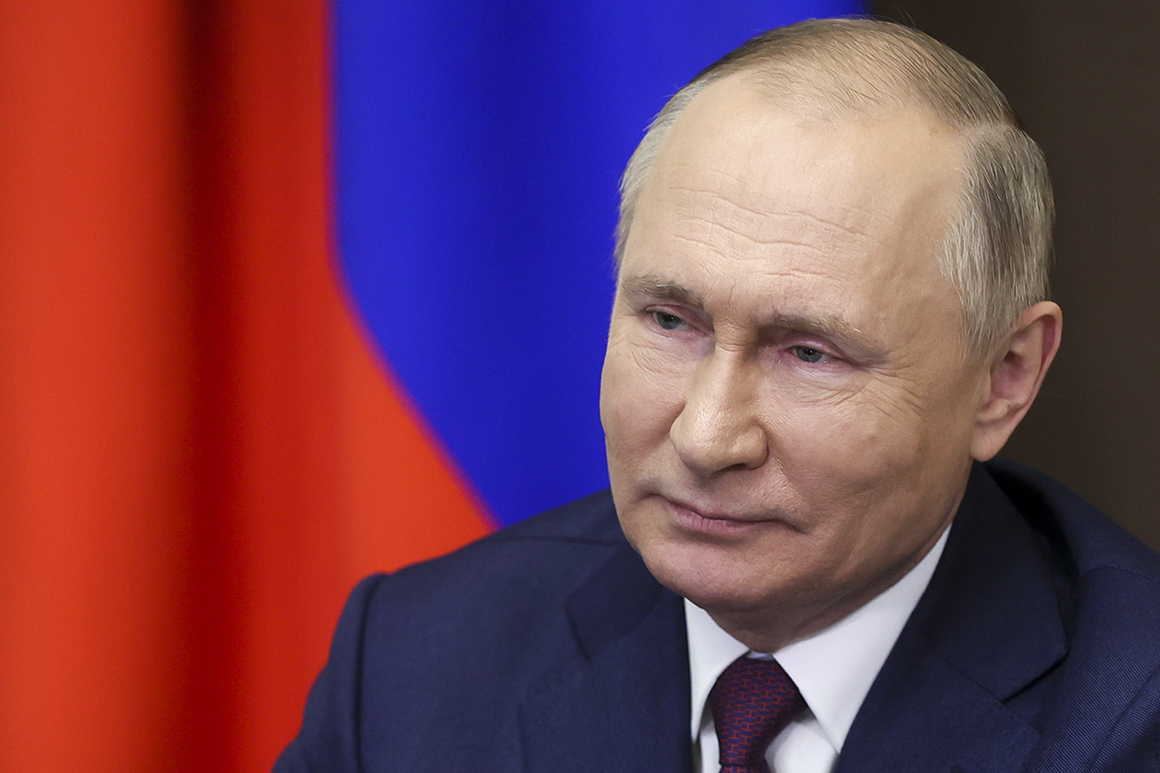
The United States has coordinated with European allies ahead of President Joe Biden’s call with Russian President Vladimir Putin on Tuesday on a package of financial sanctions that would impose “significant and severe economic harm on the Russian economy” should Putin proceed with an invasion of Ukraine, according to a senior Biden administration official.
“We have had intensive discussions with our European partners about what we would do collectively in the event of a major Russian military escalation in Ukraine, and we believe that we have a path forward that would involve substantial economic countermeasures by both the Europeans and the United States,” the official said on Monday during a call organized by the National Security Council.
The official also outlined further communication to take place between the United States and its allies both before and after Biden and Putin’s secure video call: Biden will speak with “key European allies” later Monday and Secretary of State Antony Blinken will speak with Ukrainian President Volodymyr Zelensky “in advance of” the Biden-Putin call.
Biden also will speak with Zelensky “in the days following” the call with Putin, the official added.
The threat of a Russian invasion of Ukraine has ramped up over the past week, with the Washington Post first reporting last Friday that U.S. intelligence officials suspect Moscow is planning a multi-front offensive involving up to 175,000 troops that could take place as soon as early next year.
Meanwhile, U.S. officials have escalated their warnings that Washington will retaliate if Moscow moves its forces across the border into Ukraine, as it previously did in 2014.
Blinken, speaking last Wednesday at the conclusion of a North Atlantic Treaty Alliance meeting in Latvia, cautioned that the United States is “prepared to impose severe costs for further Russian aggression in Ukraine.”
“We’ve made it clear to the Kremlin that we will respond resolutely, including with a range of high-impact economic measures that we’ve refrained from using in the past,” Blinken said.
Last Thursday, Blinken met face-to-face with his Russian counterpart, Foreign Minister Sergey Lavrov, on the sidelines of a meeting of the Organization for Security and Cooperation in Europe last Thursday in Sweden.
Following that session, Blinken told reporters at a news conference that he “made very clear our deep concerns and our resolve to hold Russia responsible for its actions, including our commitment to work with European allies to impose severe costs and consequences on Russia if it takes further aggressive action against Ukraine.”
Then, last Friday, Blinken warned again in an interview with Reuters that “there will be very serious consequences” if Russia “engages in renewed aggression against Ukraine.”
Biden, for his part, told reporters last Friday that he has been in “constant contact” with the Ukrainian government and America’s European allies, adding that Blinken and national security adviser Jake Sullivan also have been “engaged extensively.”
“What I am doing is putting together what I believe to be will be the most comprehensive and meaningful set of initiatives to make it very, very difficult for Mr. Putin to go ahead and do what people are worried he may do,” Biden said. “But that’s in play right now.”
Announcing the plans for the Biden-Putin call last Saturday, White House press secretary Jen Psaki said in a statement that the president would “underscore U.S. concerns with Russian military activities on the border with Ukraine and reaffirm the United States’ support for the sovereignty and territorial integrity of Ukraine.”
Russia’s rhetoric has shifted in recent months from its years-long demand that Ukraine not be allowed to join NATO, to an objection to any NATO presence in Russia. American, British and Canadian troops currently train Ukrainian forces at a site in the far western corner of the country.
“I think it’s interesting that the Russian line is shifting,” British Ambassador to the United States Karen Piece told POLITICO. “Although when they went into Georgia in 2008, they didn’t use the ‘Georgia is getting too close to NATO’ argument. But they did use it once they were there.”
By arguing the NATO presence in Ukraine is a threat to Russia, Pierce said Putin “is laying out a narrative that he can use around the world if he so chooses. … He has the capabilities there. But Putin usually has more than one plan at any given moment. And he’s very good at dialing up and dialing down depending on our response.”
Paul McLeary contributed to this report.
----------------------------------------
By: Quint Forgey
Title: U.S. and Europe ready 'significant and severe' sanctions if Russia invades Ukraine
Sourced From: www.politico.com/news/2021/12/06/us-and-europe-ready-significant-and-severe-sanctions-if-russia-invades-ukraine-523790
Published Date: Mon, 06 Dec 2021 13:00:37 EST
Did you miss our previous article...
https://consumernewsnetwork.com/politics-us/meadows-withdraws-from-a-tentative-cooperation-agreement-with-jan-6-investigators






